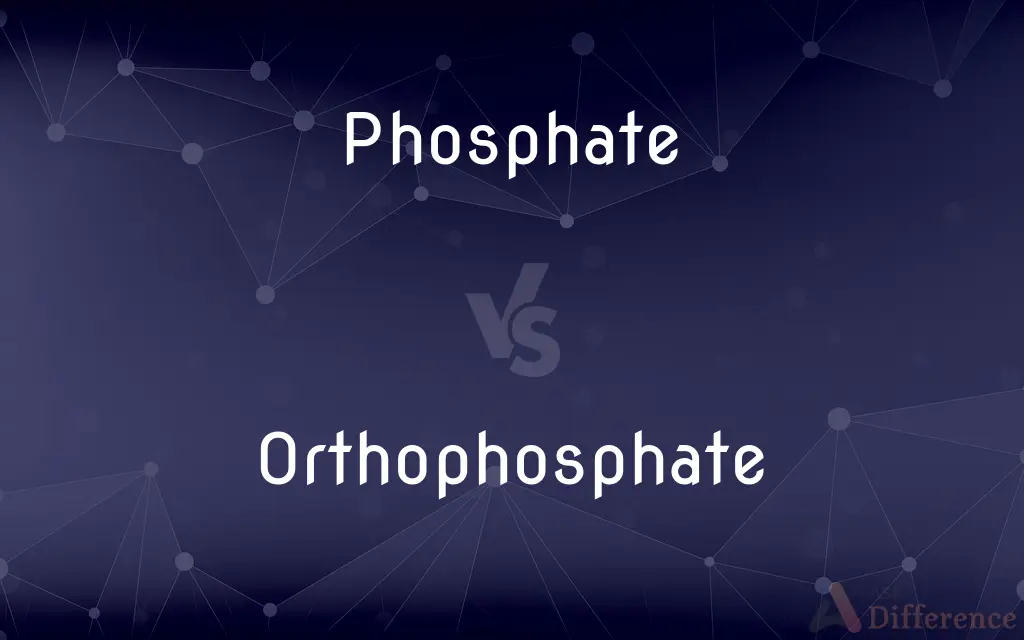Phosphate vs. Orthophosphate — What's the Difference?
Edited by Tayyaba Rehman — By Fiza Rafique — Updated on September 26, 2023
Phosphate refers to any salt or ester of phosphoric acid, while Orthophosphate is a specific type of phosphate where the phosphate ion is not condensed or combined with another anion.

Difference Between Phosphate and Orthophosphate
Table of Contents
ADVERTISEMENT
Key Differences
Phosphate is a broad term encompassing any compound that results from the chemical reaction of phosphoric acid with a base. Phosphates are crucial in biochemistry due to their role in DNA, ATP, and other fundamental processes. On the other hand, Orthophosphate specifically denotes phosphates in which the phosphate ion stands alone and isn't condensed or combined with another anion.
While Phosphate can be a part of various chemical structures, Orthophosphate is straightforward, consisting of a simple, non-condensed phosphate anion. This distinction is essential in chemistry and environmental sciences because the behavior of these molecules can differ based on their structures. For example, in water treatment, recognizing the type of phosphate can be crucial in managing nutrient pollution.
In the realm of fertilizers, Phosphate is a vital component due to its ability to support plant growth. However, when specifying the type of phosphate, Orthophosphate can be singled out as it is readily available for plant uptake. This immediate availability differentiates Orthophosphates from other phosphates which might need conversion in the soil before plants can absorb them.
To elaborate further, all Orthophosphates are phosphates, but not all phosphates are Orthophosphates. This is analogous to stating that every square is a rectangle, but not every rectangle is a square. Phosphates encompass a larger group, with Orthophosphate being a specific member of this group.
Comparison Chart
Definition
Any compound formed from phosphoric acid by replacement of some or all of its hydrogen atoms with metal ions or organic groups.
A phosphate ion that isn't condensed or combined with another anion.
ADVERTISEMENT
Chemical Structure
Can be part of various structures.
A simple, non-condensed phosphate anion.
Application in Plants
Used in fertilizers to support plant growth.
Readily available form of phosphate for plant uptake.
Scope
Broader term encompassing various phosphates.
A specific type of phosphate.
Presence in Nature
Present in many natural and synthetic forms, including rocks and DNA.
Common in soils and waters and can be an indicator of certain types of pollution.
Compare with Definitions
Phosphate
A salt or ester of phosphoric acid.
Rocks rich in phosphate are mined for fertilizer.
Orthophosphate
A specific type of phosphate anion.
We need to distinguish between general phosphates and Orthophosphate in the experiment.
Phosphate
An anion or radical PO4.
Phosphate groups are essential in biochemistry.
Orthophosphate
The inorganic form of phosphate in waters and soils.
Testing for Orthophosphate can help understand nutrient cycles in ecosystems.
Phosphate
A molecule or ion essential for life.
DNA is structured around phosphate groups.
Orthophosphate
A simple, non-condensed phosphate ion.
The water sample revealed a high concentration of Orthophosphate.
Phosphate
Found in various natural forms.
Certain foods are naturally high in phosphate.
Orthophosphate
Can indicate certain types of pollution in waters.
High Orthophosphate levels might suggest nutrient pollution in the lake.
Phosphate
A crucial nutrient for plants.
The soil lacks phosphate, affecting plant growth.
Orthophosphate
The readily available form of phosphate for plants.
To boost immediate plant growth, Orthophosphate is preferred.
Phosphate
In chemistry, a phosphate is an anion, salt, functional group or ester derived from a phosphoric acid. It most commonly means orthophosphate, a derivative of orthophosphoric acid H3PO4.
Orthophosphate
(inorganic chemistry) Any salt or ester of orthophosphoric acid; an ordinary phosphate
Phosphate
A salt or ester of phosphoric acid, containing PO₄³⁻ or a related anion or a group such as —OPO(OH)₂.
Orthophosphate
A salt of phosphoric acid
Phosphate
An effervescent soft drink containing phosphoric acid, soda water, and flavouring.
Phosphate
A salt, ester, or anion of phosphoric acid, derived by removal or replacement of one, two, or especially all three of the hydrogens of phosphoric acid.
Phosphate
A fertilizer containing phosphorus compounds.
Phosphate
A soda fountain drink made by blending carbonated water with flavored syrup.
Phosphate
(chemistry) Any salt or ester of phosphoric acid.
Phosphate
(agriculture) Any fertiliser containing phosphate compounds.
Phosphate
Guano (containing high levels of phosphates and harvested for the fertiliser industry).
Phosphate
A carbonated soft drink containing phosphoric acid, often flavored with a fruit-based syrup.
Phosphate
To treat or coat with a phosphate or with phosphoric acid
Phosphate
A salt of phosphoric acid.
Phosphate
A salt of phosphoric acid
Phosphate
Carbonated drink with fruit syrup and a little phosphoric acid
Common Curiosities
Can high levels of Orthophosphate indicate pollution?
Yes, high levels in waters can suggest nutrient pollution.
Is Orthophosphate a type of phosphate?
Yes, Orthophosphate is a specific form of phosphate.
Are phosphate and Orthophosphate used in fertilizers?
Yes, both are used, but Orthophosphate is immediately available for plant uptake.
Are all phosphates readily available to plants?
No, but Orthophosphate is because of its simple structure.
Why is phosphate crucial in biochemistry?
Phosphate is integral to molecules like DNA and ATP, which are vital for life processes.
Is Orthophosphate the only type of phosphate in fertilizers?
No, but it's favored due to its immediate availability to plants.
Do all phosphates have the same chemical structure?
No, only Orthophosphate has the simple, non-condensed PO4 structure.
Do both phosphates and Orthophosphates occur naturally?
Yes, both can be found in nature, especially in rocks and soils.
Are there environmental concerns associated with phosphates?
Yes, excessive phosphates can lead to issues like algal blooms in water bodies.
Why might someone want to measure Orthophosphate in water?
To assess nutrient levels and potential nutrient pollution.
Can foods be sources of phosphate?
Yes, certain foods naturally contain phosphate.
How do phosphates support life?
They're key components of DNA, ATP, and various biochemical processes.
Is the phosphate in DNA the same as Orthophosphate?
The phosphate in DNA is a type of phosphate, but in a more complex structure than Orthophosphate.
How is Orthophosphate different in structure from other phosphates?
Orthophosphate has a non-condensed, simple anion structure.
Why is phosphate mined?
It's a crucial ingredient in fertilizers to aid plant growth.
Share Your Discovery

Previous Comparison
Philosophy vs. Psychology
Next Comparison
Emacs vs. ViAuthor Spotlight
Written by
Fiza RafiqueFiza Rafique is a skilled content writer at AskDifference.com, where she meticulously refines and enhances written pieces. Drawing from her vast editorial expertise, Fiza ensures clarity, accuracy, and precision in every article. Passionate about language, she continually seeks to elevate the quality of content for readers worldwide.
Edited by
Tayyaba RehmanTayyaba Rehman is a distinguished writer, currently serving as a primary contributor to askdifference.com. As a researcher in semantics and etymology, Tayyaba's passion for the complexity of languages and their distinctions has found a perfect home on the platform. Tayyaba delves into the intricacies of language, distinguishing between commonly confused words and phrases, thereby providing clarity for readers worldwide.














































